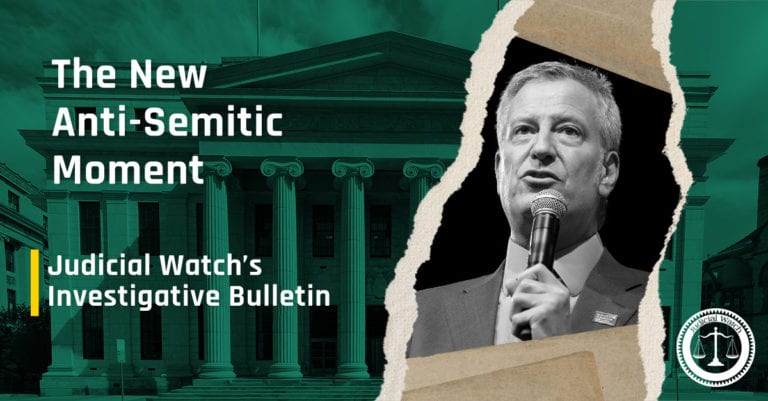

The New Anti-Semitic Moment


The impeachment trial of President Trump rolls on, but back in the real world, signs of a different sort of trouble are growing. It now seems clear we are living in a new anti-Semitic moment. From American college campuses to the streets of New York, from the cities of Europe to the Arab countries of the Middle East, reports of anti-Semitism emerge on a daily basis.
At Judicial Watch, we have been closely tracking developments. Judicial Watch President Tom Fitton announced in May our legal action to shine a light on Arab government support for anti-Semitic activities at American universities. In September, we warned that rising anti-Semitic incidents in New York City signaled increasing social disorder.
The data have been moving in the wrong direction for several years. In November, the Anti-Defamation League released a sweeping global survey showing that nearly twenty-five percent of Europeans “harbor pernicious and pervasive attitudes toward Jews,” with rising numbers in Eastern and Central Europe. The numbers are also up in Russia, South Africa, Brazil and Argentina. The attitudes are bonkers but familiar: the Jews control international finance, the U.S. government, the media; they are too loyal to Israel; they talk too much about the Holocaust.
In the U.S., anti-Semitic incidents were up 29% from 2015 to 2018, the Wall Street Journal reports. Numbers from the NYPD show that New York City, which has the largest Jewish population in the country, saw anti-Semitic hate crimes in 2019 jump 26% from the previous year.
In December, two assaults on Jews rocked the New York area. On December 10, a crazed duo gripped by anti-Semitic conspiracy theories assassinated a police detective and invaded a kosher market in Jersey City, killing three. Two weeks later, during Hanukah, a lunatic with a machete stormed into a gathering in Monsey, New York, injuring five. The lurid attacks seized headlines, but it’s the quotidian that is really unsettling, the daily reports filtering in largely under the radar: anti-Semitic slurs shouted on the Upper West Side, a man punched in the head; drunks outside a bar in Crown Heights taunt Orthodox Jews, assaults later reported; a subway stalker in a viral moment berating riders about Jewish power; swastikas found scrawled in a schoolyard, on a parked car, at a beachfront cabin; a Jewish child harassed at school for wearing a yarmulke; an Orthodox woman walking with her three-year-old son attacked from behind: “you f—ing Jew,” the assailant says, “your end is coming.”
Politicians in New York and Washington responded by doing the conventional things politicians do. Congress put another $30 million into a grants program to harden security at religious sites. Jewish leaders called on social media to crack down on anti-Semitic hate speech. The Trump Administration, acting on a toxic mix of anti-Israel actions and anti-Semitism on American campuses, issued an executive order expanding interpretation of the Civil Rights Act to cover Jews in academic settings.
New York’s solutions: money, cops, education. Governor Andrew Cuomo announced $45 million in new funding to protect religious institutions. New York City Mayor Bill de Blasio boosted the police presence in neighborhoods with large Jewish populations and announced the creation of new safety coalitions. The head of his Office for the Prevention of Hate Crimes said she would focus on education programs in schools.
The New York response quickly became mired in disputes. Critics noted that Cuomo’s “new” $45 million for security funding in fact already was in last year’s budget. De Blasio’s hate crimes office seems oddly adrift, understaffed and underfunded. And the mayor himself took to the radio waves to blame anti-Semitic acts on “right-wing forces.”
De Blasio’s remarks came in the wake of the kosher market killings and underscored why so many New Yorkers find him such a tiresome wretch—the market murders had zero connection to right-wing ideology. Ditto the Hanukah attack. But the two incidents seemed to crystalize the anti-Semitic moment we find ourselves in: a time of anti-Jewish trends at home and abroad converging from various points on the ideological spectrum, sped up in an age of global social media, often ending in bloodshed. There’s no telling how long the moment will last or what will happen next, but history is not reassuring.
***
Micah Morrison is chief investigative reporter for Judicial Watch. Follow him on Twitter @micah_morrison. Tips: [email protected]
Investigative Bulletin is published by Judicial Watch. Reprints and media inquiries: [email protected]















